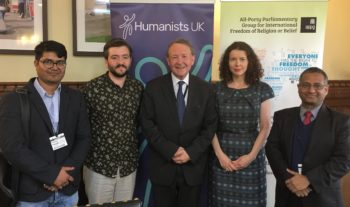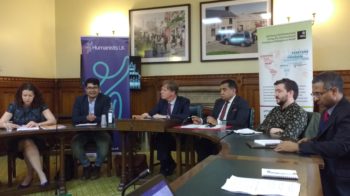
Ending blasphemy laws around the globe is ‘a priority for Government’, Foreign Office Minister of State for Human Rights Lord Ahmad of Wimbledon told the All Party Parliamentary Humanist Group (APPHG) as he addressed its meeting yesterday. Lord Ahmad, speaking at a joint meeting of the APPHG, the All Party Parliamentary Group for International Freedom of Religion or Belief and the All Party Parliamentary Human Rights Group, underlined his commitment to tackling the issue and set out ways in which the Government is seeking to address the problem.
The meeting also heard from Ahmed Shaheed, UN Special Rapporteur on Freedom of Religion or Belief; Andrew Copson, Chief Executive of Humanists UK and President of the International Humanist and Ethical Union; Asif Mohiuddin, a Bangladeshi humanist blogger who was repeatedly stabbed by Islamists and then imprisoned by the Government for blasphemy; and Barbora Bukovská, Senior Director for Law and Policy at Article 19.
Andrew Copson, speaking first, laid out the facts that around 55 countries have blasphemy or apostasy laws, while 13 punish such ‘crimes’ with death. Things in some parts of the world are going backwards, with Mauritania having passed a harsher blasphemy law just last month – upping the death penalty to ‘mandatory’. In other countries there are ostensibly ‘dead letter’ laws but these are also problematic, not only because they can be reactivated, but also because they legitimise more severe laws elsewhere.
Ahmed Shaheed expressed a desire for EU states to do more on tackling blasphemy laws globally, and said that he feared the fact that some EU states still have such laws may be holding back action. The need for more coordination between a core group of states is imperative, and this means working to implement the Rabat Plan of Action. In the short term, perhaps the focus with some countries should be to manage the effects of their blasphemy laws, whereas in the longer term the focus should of course be elimination.

Asif Mohiuddin explained how in 2013 he was arrested three times by Bangladeshi authorities for ‘blasphemous’ blog posts and was in prison for a total of three months. He faced up to ten years in jail for his crimes and his case is still pending, although he fled to Germany in 2014. In between his arrests he was attacked by Islamists who stabbed him nine times and barely escaped with his life. He later found himself in the same jail cell as his attacker, and asked him why he did it. He found that his attacker had studied in a Saudi-founded madrasah, and his family had sent him there because they were poor and the madrasah provided him food and shelter. He underlined the need for education to better tackle extremism.
Barbora Bukovská explained how Article 19 was founded after the campaigns against Humanists UK patron Salman Rushdie’s The Satanic Verses, and its supposedly blasphemous content. She discussed the need for Western states to lead by example and not shy away due to the need to also tackle religious intolerance at home. She underlined the need to work through international channels such as the Istanbul Process and the Rabat Plan of Action, as well as to work with national law enforcement agencies to shape their focus away from blasphemy and onto incitement to hatred and violence only (in line with General Comment No 34).
Responding to the four speakers, Lord Ahmad of Wimbledon explained that ‘this is a priority for the Government’. He outlined the interplay between freedom of expression and freedom of religion or belief, and how denial of one often means denial of the other. He explained that it is an issue the UK is working on internationally alongside others, including through the UN and the Commonwealth. He talked about how education must be a priority and the UK Government is looking at what international education projects it is funding to ensure the UK is doing the best it can in this area. And he agreed with Andrew that even supposedly ‘dead’ blasphemy laws need tackling.
Comments from the floor highlighted the need to ensure that only more senior officials in certain jurisdictions can bring charges and hear them, for it to be lawful to repeat the supposed offences as part of evidence without a fresh offence thus being committed, and for champions to be identified within the OIC.
Notes
For further comment or information, please contact Humanists UK Director of Public Affairs and Policy Richy Thompson on richy@humanists.uk or 020 3675 0959.
Read more about Humanists UK’s international campaigns work: https://humanists.uk/campaigns/international-campaigns/
At Humanists UK, we advance free thinking and promote humanism to create a tolerant society where rational thinking and kindness prevail. Our work brings non-religious people together to develop their own views, helping people be happier and more fulfilled in the one life we have. Through our ceremonies, education services, and community and campaigning work, we strive to create a fair and equal society for all.
